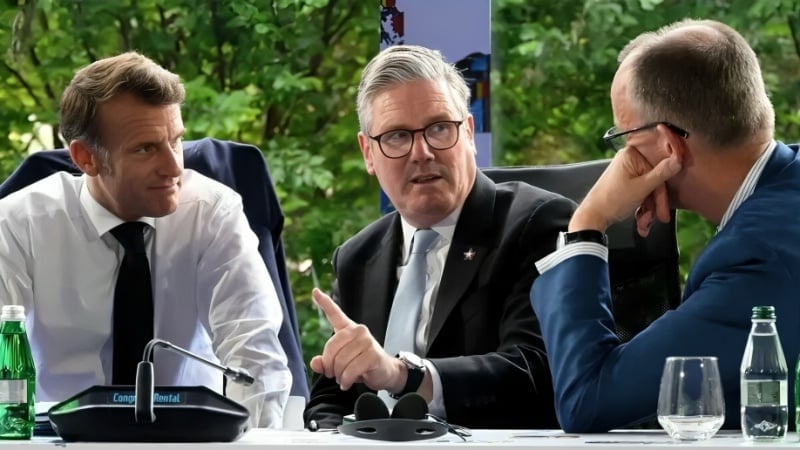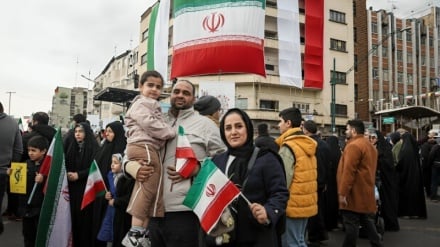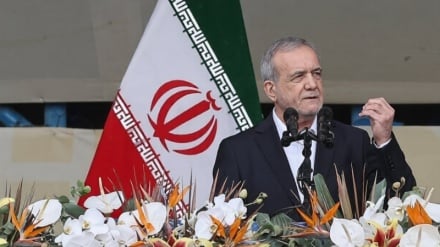Why does Iran consider European Troika's activation of snapback mechanism illegal?
-

The leaders of France, Britain, and Germany (the European Troika)
Pars Today – A closed-door United Nations Security Council meeting was held on Friday, August 29, to address the initiation of the snapback process by the European Troika.
According to Pars Today, Amir Saeid Iravani, Iran's Ambassador and Permanent Representative to the United Nations, following the meeting, denounced the "illegal" action of the three European countries in declaring the initiation of the snapback process as "unacceptable." He stated that this move bypasses the JCPOA's dispute resolution mechanism and emphasized: "Iran is committed to diplomacy, but it will never negotiate under threat or coercion." He described the European Troika's action as merely an attempt to extort Iran and exert political pressure. According to him, the request for a closed-door UN Security Council meeting by France and Britain was also aimed at justifying their illegal action, motivated by political intentions, and using the Council as a tool to serve their own purposes against Iran.
Iran has provided several reasons for rejecting Europe's activation of the snapback mechanism. UN Security Council Resolution 2231, which endorsed the JCPOA, permits the snapback mechanism only for "participant states" of the agreement. However, the European parties have, in practice, failed to take any effective measures to preserve the deal.
Iran argues that European countries cannot legally invoke this mechanism unless specific conditions outlined in the agreement are met—conditions that have not been fulfilled. Additionally, Iran maintains that its own steps to scale back JCPOA commitments were taken in response to other parties' violations of the agreement and were conducted within the framework of the deal's provisions.
Therefore, there is no legal basis for activating the snapback mechanism. Iran also believes that by threatening to trigger snapback and now activating it, the European countries are effectively using an international agreement as a tool for political coercion rather than upholding peace and security. From Iran’s perspective, such actions by Europe undermine diplomatic processes and negotiations and erode mutual trust. Iran has repeatedly criticized Europe for failing to fulfill its JCPOA commitments while simultaneously employing pressure tactics against Iran.
Interestingly, on Friday, August 29, the British Ambassador to the United Nations, speaking on behalf of the European Troika, justified his country's anti-Iranian action by claiming that the 30-day period for activating the snapback mechanism does not mean the end of diplomacy. He stated: "Our proposals remain on the table, we remain committed to diplomacy, and we encourage Iran to reach a solution based on our proposal."
The three European countries, members of the P4+1 group—Germany, France, and the United Kingdom, collectively known as the European Troika—which have so far failed to fulfill their commitments under the JCPOA nuclear agreement, officially submitted a notification to the United Nations Security Council on Thursday, August 28, 2025, activating the snapback mechanism to reinstate anti-Iran sanctions. They stated that, under certain conditions, they are prepared to negotiate with the Islamic Republic of Iran over the next 30 days regarding the nuclear agreement, which could halt the process of reinstating sanctions.
A notable point is the clear divergence in stance among the three major international powers—the Western bloc represented by the United States and the Eastern bloc represented by Russia and China—regarding the European Troika's initiation of the snapback mechanism.
U.S. Secretary of State Marco Rubio welcomed the European move, stating: "In the coming weeks, we will work with them and other members of the UN Security Council to successfully conclude the process of reinstating sanctions and international restrictions against Iran, in accordance with the U.S. President’s directive in National Security Memorandum No. 2."
In contrast, Russia and China have criticized the European Troika's move, describing it as unjustifiable. In this regard, the Russian Foreign Ministry, recalling that Iran had faithfully implemented the JCPOA for several years, labeled the European Troika's efforts to reinstate UN Security Council sanctions against Iran (snapback) as illegal and condemned the action.
"Mikhail Ulyanov, Russia's Permanent Representative to International Organizations in Vienna, described the attempt by the three European countries to activate the snapback mechanism as an unjustifiable move and called on them to revoke their decision. In response to the European Union's activation of the snapback, the Chinese Foreign Ministry stated that reimposing sanctions on Iran at the UN Security Council is a counterproductive measure and emphasized: 'The Iranian nuclear issue is at a critical stage, and dialogue and negotiations must be resumed.'"
It is noteworthy that even Western sources have expressed serious doubts regarding the effectiveness of the European Troika's move against Iran. The American think tank Quincy Institute, in an article titled "Europe’s Gamble on Triggering Snapback Risks Destroying Diplomacy with Iran," warned: "If Europe chooses coercion over cooperation, the window of opportunity may slam shut entirely." Similarly, Foreign Policy magazine cast doubt on the success of activating the snapback mechanism, noting: "The reinstatement of UN Security Council sanctions is largely symbolic and cannot effectively target Iran, while Russia and China have the capacity to disrupt their implementation."
Thus, it appears that by initiating the snapback mechanism, Europe has effectively played its card and, despite expressing readiness to continue dialogue with Iran, may no longer hold a significant position in potential indirect negotiations between Iran and the United States.


